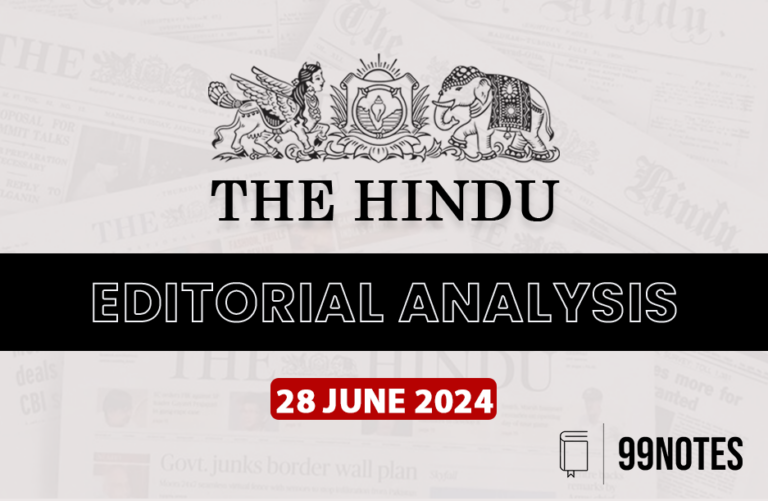7 March 2024 : The Hindu Editorial Notes PDF
The Hindu Editorial
7-March-2024
1. The tale of ‘have money, buy miracle drug’
| Topic: GS2 – Social Justice – Health Relevant to UPSC as it underscores health governance issues, ethics in medical practice, and regulatory challenges in India. |
| Context |
|
Introduction:
- Newspapers regularly feature articles on ‘magic injections’ containing Semaglutide, a drug for Type 2 diabetes that promotes weight loss.
- These injections are not approved for sale in India but are administered by doctors to affluent patients, raising ethical and safety concerns.
- Global pharma companies issue warnings, but media fails to publicize them, and significant side effects remain unreported.
Approval Process and Exceptions:
- In India, drugs are approved after clinical trials by the local subsidiary or licensee of the global brand owner.
- Regulatory approval involves monitoring adverse events for two years.
- Patients and hospitals can import unapproved drugs for personal use or special cases with regulatory approval.
Lack of Clinical Trials in India:
- Unapproved weight loss drugs lack clinical trials in India, posing risks as the reaction in the Indian population remains unknown.
- Potential interactions with drugs commonly prescribed in India, such as those for diabetes and hypertension, are uncertain.
- The absence of clinical data poses a significant, unmitigated risk.
Questions for Doctors:
- Doctors face ethical dilemmas regarding prescribing unapproved drugs.
- Incentives for doctors prescribing these drugs raise concerns about their motivations.
- The extent of doctors’ knowledge about the full effects and adverse events of these drugs is questionable.
- The likelihood of clients using illegally imported drugs is high, given the lack of regulatory approval.
Imported Drugs Scandal:
- The scandal involving spurious drugs like Adcetris highlights the issue of delayed alerts by regulators.
- Doctors must ensure the authenticity of drugs before administering them, raising doubts about their due diligence.
- The Semaglutide case reinforces concerns, as alerts from pharma companies suggest potential complicity in a scam.
Questions for Regulators:
- Government and drug regulators must address the import control of unapproved drugs.
- The potential for arrests and legal consequences may serve as a deterrent to doctors involved in administering these drugs.
Public Indifference:
- The public’s indifference towards this issue is noted, portraying it as a problem for the affluent.
- The government’s priorities are questioned, especially considering previous incidents like deaths from spurious cough syrup.
Conclusion:
- The situation prompts reflection on the government’s responsibility and public apathy towards illegal and potentially harmful drugs.
- The need for stringent measures to control the import and administration of unapproved drugs is evident.
- The ethical dilemmas faced by doctors and the potential risks to patients highlight the urgency for regulatory intervention and public awareness.
| Practice Question: Examine the ethical implications and regulatory concerns surrounding the unauthorized use of weight loss drugs like Semaglutide in India. Discuss the roles of healthcare practitioners, pharmaceutical companies, and government regulators in addressing this issue. (150 Words /10 marks) |
2. The legislature should complement the judiciary in fighting corruption
| Topic: GS2 – Indian Polity This topic is crucial for UPSC as it examines the synergy between legislature and judiciary in tackling corruption, a key national concern. |
| Context |
|
Additional information on this news:
- Tirukkoyilur Assembly constituency declared vacant due to the conviction and disqualification of former Higher Education Minister K. Ponmudy in a disproportionate assets case in December.
- Despite the Madras High Court’s conviction order not being stayed by the Supreme Court, there was a significant delay in declaring Tirukkoyilur vacant.
- AIADMK General Secretary, Edappadi K. Palaniswami, urged the Assembly Speaker to act impartially in declaring the seat vacant.
- Ponmudy’s disqualification falls under Section 8(1) of the Representation of the People Act, 1951, listing offenses under laws such as the Narcotic Drugs and Psychotropic Substances Act and Prevention of Corruption Act.
- Section 8(1) mandates immediate disqualification upon conviction, but the delay in this case raises questions.
- Calls for legislative support of the judiciary in anti-corruption cases involving lawmakers to maintain confidence in the democratic system.
- Emphasizes the importance of upholding democratic values, protecting dissent, and avoiding any perception of authoritarianism or judicial overreach.
| Legislature’s Role in Anti-Corruption: |
Issues:
Solutions:
By addressing these issues and collaborating with the judiciary, the legislature can play a crucial role in creating a robust and effective anti-corruption ecosystem. |
| Practice Question: Critically examine the challenges faced by the Indian legislature in complementing the judiciary’s efforts to fight corruption, and suggest relevant measures to overcome these challenges. (250 Words /15 marks) |
3. A judge’s entry into politics
| Topic: GS2 – Indian Polity – Judiciary UPSC Significance: Examines risks of judicial-political overlap, impacting impartiality and governance; crucial for constitutional understanding and ethical governance. |
| Context |
|
Additional information on this news:
- Abhijit Gangopadhyay, a former judge of Calcutta High Court, resigned and announced joining the Bharatiya Janata Party (BJP) during West Bengal’s election season.
- The 61-year-old judge expressed interest in a BJP ticket for the upcoming Lok Sabha polls.
- His decision raised concerns about the political bias in his past judgments, prompting the Trinamool Congress to seek a review of all his orders.
- Gangopadhyay had issued orders directing CBI investigations into the school and municipal recruitment scam in West Bengal, leading to significant setbacks for the ruling Trinamool Congress.
- The former judge criticized Trinamool, calling it an “ajatra party” and made scathing remarks about its leaders.
- Gangopadhyay had a controversial career, with Supreme Court interventions in 2023 and 2024 regarding allegations against a senior judge and a stay on an order related to case reassignment.
- Resigning five months before superannuation, he faces criticism and questions about the timing, with opponents suggesting potential influence on judgments.
- Gangopadhyay stated his desire to contribute on a “larger platform” than the judiciary and is expected to enter politics, raising speculation about his commitment to fighting corruption in his new role.
| Issues with Supreme Court / High Court Judges joining politics: |
Issues:
Way Forward:
|
| PYQ: Constitutionally guaranteed judicial independence is a prerequisite of democracy. Comment. (150 words/10m) (UPSC CSE (M) GS-2 2023) |
| Practice Question: Analyze the potential consequences of Supreme Court and High Court judges entering politics, and suggest measures to safeguard judicial independence. (250 Words /15 marks) |
For Enquiry

7 March 2024 : The Hindu Editorial Notes PDF

7 March 2024 : PIB Summary for UPSC

7 March 2024 : Indian Express Editorial Analysis

6 Mar 2024 : Daily Current Affairs Quiz

6 Mar 2024 : Daily Answer Writing

6 March 2024 : The Hindu Editorial Notes PDF

6 March 2024 : PIB Summary for UPSC

6 March 2024 : Daily Current Affairs

6 March 2024 : Indian Express Editorial Analysis

5 Mar 2024 : Daily Current Affairs Quiz
March – The Hindu Editorial 7 March 2024 : The Hindu Editorial Notes PDF The Hindu Editorial
6-March-2024
1. Green jobs and the problem of gender disparity
Topic: GS3 –…
March 2024 PIB 7 March 2024 : PIB Summary for UPSC PIB Summary for UPSC
7-March -2024
1. Promoting Clean Coal Technology: Coal Gasification
Topic: GS3…
Indian Express 7 March 2024 : Indian Express Editorial Analysis Indian Express Editorial Analysis
7-March-2024
1. The thin-fat Indian
Topic: GS2 – Social Justice…
Daily Quiz 6 Mar 2024 : Daily Current Affairs Quiz 6 Mar 2024 : Daily Quiz…
mains answer writing 6 Mar 2024 : Daily Answer Writing Mains Answer Writing
6-March-2024
Q1) The Finance Commission serves as the balancing wheel of fiscal…
March – The Hindu Editorial 6 March 2024 : The Hindu Editorial Notes PDF The Hindu Editorial
6-March-2024
1. Green jobs and the problem of gender disparity
Topic: GS3 –…
March 2024 PIB 6 March 2024 : PIB Summary for UPSC PIB Summary for UPSC
6-March -2024
1. India targets five-fold increase in its share of the global space…
Daily Current Affairs 6 March 2024 : Daily Current Affairs Daily Current Affairs
6-March -2024- Top News of the Day
1. Bombay High Court Acquits G N Saibaba: Emphasizes…
Indian Express 6 March 2024 : Indian Express Editorial Analysis Indian Express Editorial Analysis
6-March-2024
1. For the Gaya Lals of today
Topic: GS2 – Polity…
Daily Quiz 5 Mar 2024 : Daily Current Affairs Quiz 5 Mar 2024 : Daily Quiz…



